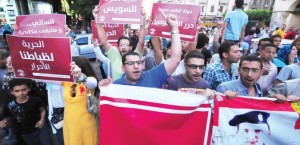
The family of Ahmad Al-Gizawy is still waiting for their day in court. After the Egyptian was arrested in early May in Saudi Arabia on his way to perform Omra,pilgrimage with his wife, he was charged with smuggling drugs and has since been detained in a prison in the kingdom.
His family is convinced that the charges are politically-motivated. Al-Gizawy is a lawyer whose work put him in tough positions where he frequently advocated for reform of Saudi policies and critiqued the practices of the Saudi Kingdom.
His family marched on Sunday night to the Presidential palace with the families of incarcerated Egyptians, many of who have already had a fateful day in court.
The peaceful march called for the release of all military detainees and political prisoners in custody since the January uprising. The marchers’ main objective is to present to the newly sworn President Mohamed Morsi the ongoing demand of freeing all those held captive in military prisons. Participants in the march gathered at Roxy, a square in the upscale neighbourhood of Heliopolis.
The demonstrators, approximately 500 in total formed human chains and called for the release of all military detainees while they headed toward the presidential palace. To support the families, representatives of the April 8 officers’ movement, a group of military officers, Hazemoon movement,Mohamed El-Baradei’s campaign,Salafeyo Costa also joined the march.
The group was also joined by the families of victims of injustice in Egypt, the mother of Khaled Said, the sister of victim of the Maspero massacre, Mina Daniel as well as activist Ahmed Doma, Ahmed Harara, Nawara Negm, and several detainees released awaiting trial.
While, the No Military Trials movement wasn’t on the official list of participants, Shahira Abouellail, one of the co-founders of the No Military Trials movement told the Daily News Egypt, “we fully support the demands of the march.” Members of No Military Trials, she said “ will take part in the march individually,yet we weren’t among the movements who officially called for it.” Abouellail also stressed the main objectives of the movement was “the freedom for all those tried in front of exceptional courts”.
“We’re trying to formulate a delegation that would request a meeting with the president,” Abdel Rahman Yousef, a former coordinator for El-Baradei’s presidential campaign, told the Daily News Egypt before the march started. “The delegation would ideally consist of a legal committee with all the relevant data about the detainees as well as the detainees’ families,” he said.
Beside calling for full amnesty to all the uprising’s prisoners, especially those detained in military prisons – almost 16,000, according to the march’s organizers — the march also touched upon the issue of Egyptians detained abroad, especially in prisons in the Gulf. “There are 100,000 Egyptians inside Gulf prisons,” Yousef added.
As for his pledge made in Tahrir to free those tried in military courts, President Morsi established a committee made up of representatives from Egypt’s various branches of justice including the military judiciary, the public prosecutor and the Ministry of Interior, to review the cases of those arrested after the January uprising, acquitting those who have not been proven to have committed any criminal offense.
Abouellail is hopeful President Morsi will follow through on his promises in order to “prove that he shall stick by the revolution’s demands.”




